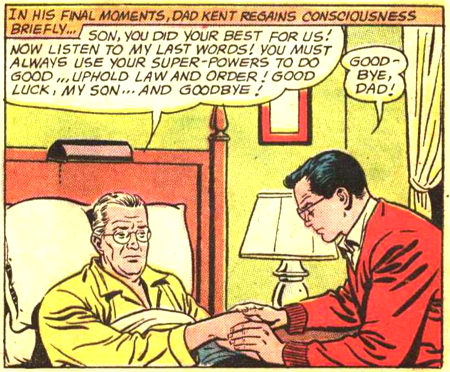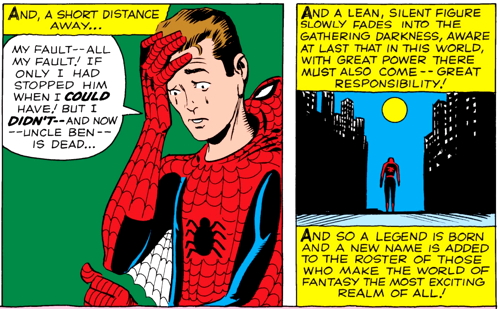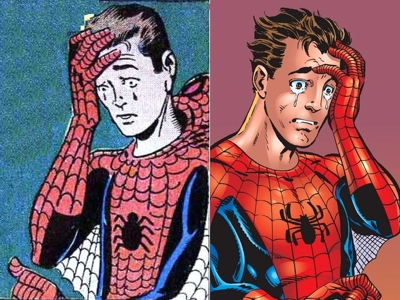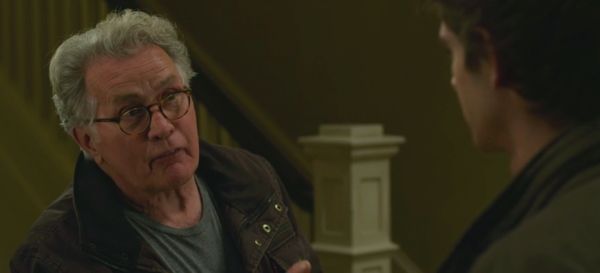It’s been a rough afternoon for young Clark Kent, secret teenage king of the sky. First he got left behind after football practice, and then he met the love of his life, who it turns out is nine years old and currently heading east on the Kansas Star. Now he’s getting advice from his foster father in a lengthy one-take walk-and-talk, all the way up the front drive.
“I mean, every time I get the football, I can make a touchdown,” Clark says.
“That’s for sure,” his father nods.
“Every time!”
“Yeah.”
“I mean, is it showing off, if somebody’s doing the things he’s capable of doing?” Clark asks. “Is a bird showing off when it flies?”
“No, no,” Jonathan shakes his head. He’s got about sixty percent of an answer to that question, and he’s going to bluff his way through the rest of it in real time. It’s called parenting.
“Now, you listen to me,” he says. “When you first came to us, we thought that people would come and take you away, because — when they found out, y’know, the things you could do? That worried us a lot.” He sighs. “Then a man gets older, and he thinks very differently, and things get very clear. And there’s one thing I do know, son — and that is, you are here for a reason. I don’t know whose reason — whatever the reason is, y’know? Maybe it’s because… well… I don’t know, it’s…” He trails off. “But I do know one thing: it’s not to score touchdowns.”
“Well, okay,” Clark shrugs, “but could I just score a few touchdowns while I’m waiting for whatever the hell you’re talking about?”

But that’s the beauty of the scene — that Jonathan approaches something very, very big, and then he gets all Midwestern about it.
When he says “Maybe it’s because…” it’s pretty clear that he’s about to invoke God. If you live in Kansas and there’s “a reason” for something, then obviously it’s God’s reason — but then he looks at Clark, and how do you say to your teenager in cold blood that he might be kind of the Messiah?
It’s an extraordinary moment, capturing a truth about the lives of the Kents and their mystery starchild. That would clearly be a topic of curiosity and concern if these were real people, but in the forty years since these characters were created, nobody had ever taken them seriously enough to write it down.
And the framing of the shot is just showing off, really — a single take that lasts a full sixty-nine seconds, with the camera mounted on a pickup truck that’s being pulled along by crew members. It puts real focus on this moment, this conversation, in a clear signal to the audience that you’re supposed to pay a lot of attention to what’s happening here. And then the guy falls over and dies, which puts a period at the end of that sentence like you wouldn’t believe.

This is the Talk, which we’ve seen bits and pieces of over the last week that we’ve been discussing the Kents. The Talk originally came from that 1942 Adventures of Superman novel by George Lowther, the one that invented the farm family concept. In the book, Eben’s on his deathbed, reading Clark the instruction manual:
“Lad, ye have within ye powers there’s no explainin’. Ye’re a — a modern miracle, that’s what ye be. ‘Tis not for you nor me to question the ways of God.” He raised himself against the pillows. “But these powers ye have, lad, and it rests with you whether ye’ll put them to good use or to bad!”
Clark said nothing. He sat looking out at the western hills, tears burning his eyes. Old Eben went on.
“There’s great work t’ be done in this world, and you can do it. Ye must use these powers of yours to help all mankind. There are men in this world who prey on decent folk — thieves, murderers, criminals of every sort. Fight such men, son! Pit your miraculous powers against them! With you on the side of law and order, crime and oppression and injustice must perish in the end!”
Clark sat and said nothing and the shadows deepened in the room.
“One thing more —” Old Eben’s voice came feebly out of the growing darkness. “Men are strange. They believe the wrong things, say the wrong things, do the wrong things. ‘Tisn’t that they want to, but, somehow, they do. They’d not understand ye, lad. ‘Tis not given me t’say how they’d act toward ye, but I know it would not be in the right way.”
He took a deep breath before going on.
“So ye must hide your true self from them. They must never know that you’re a — a superman.”
That’s a nice emotional moment as well — old-fashioned, and in farm dialect, and Clark doesn’t get a chance to talk for three pages, but it’s a real scene, and it’s a lot better than any of the other versions managed to do. In the weird 1963 story “The Last Days of Ma and Pa Kent,” where both parents die from opening a pirate’s treasure chest in Bermuda, Jonathan manages to say, “You must always use your super-powers to do good… uphold law and order!” Which you’d imagine is material they’d already covered, since in that version, Clark has been flying around using his powers since he was a superbaby.

And then there’s the 1948 serial that we talked about yesterday, where Jonathan approached his son and said,
“You’re different from other people. Your unique abilities make you a kind of Superman. Because of these great powers — your speed and strength, your X-ray vision and super-sensitive hearing — you have a great responsibility.”
Which is — wait a minute. Great powers and great responsibility… isn’t that somebody else’s big line?

Because I was under the impression that Spider-Man got the Talk from his Uncle Ben, saying exactly the same thing.
Spider-Man’s tragic origin story came from Amazing Fantasy #15, in August 1962. In the original comic, teenage science nerd Peter Parker goes to an exhibit at the science hall on the fascinating world of atomic science, and an irradiated arachnid chomps on his hand, granting him a full set of spider powers.
At first, Peter figures he’ll use these powers to make a buck on TV, and when he sees a cop chasing a thief, Peter doesn’t bother to try and stop the crook. A little while later, Peter’s elderly uncle — who’s raised him since he was a boy — is shot and killed by a burglar, and when Peter tracks the killer down in his spider-suit, he realizes it’s the guy who he didn’t stop when he had the chance.
At the end of the story, as Peter realizes that everything is his fault and he’s been called to serve as a crime-fighter, the closing caption hammers it home: “A lean, silent figure slowly fades into the gathering darkness, aware at last that in this world, with great power there must also come — great responsibility!”

Uncle Ben’s death is a much bigger deal in Spider-Man’s origin story than Jonathan Kent’s in Superman’s, no matter how much Superman: The Movie tries to emphasize it.
For Spider-Man, Peter’s guilt about not saving his uncle is the single point of inspiration that turns him into the superhero that he’ll become, and he thinks about it pretty much every time he’s under stress. If Uncle Ben hadn’t died, Peter wouldn’t be Spider-Man — or at least, not the Spider-Man that matters.
The equivalent tragedy in Superman’s story is the death of Jor-El, and the destruction of Krypton. You couldn’t tell the story of Superman without blowing up his home planet; it wouldn’t make any sense. But you could kill Pa Kent, or both Ma and Pa, or let them both live, or any other possible permutation, because ultimately that’s not the thing that inspires him to become a hero.
That’s why the Superman chronicles all contradict each other; every time somebody tells this origin story, they make up their own timetable of Clark’s childhood. That’s especially true if Superboy is in the mix — Clark couldn’t possibly be inspired by his father’s deathbed speech, because he’d already been wearing the cape and helping people out since he was a little kid.

The funny thing about Uncle Ben’s “great powers/great responsibility” line is that Uncle Ben doesn’t actually say it. In the first Spider-Man story, Ben Parker has exactly two lines of dialogue:
- You’re not foolin’ me, Petey! I know you’re awake — and it’s time for school!
- Don’t fatten him up too much, dear! I can hardly out-wrestle him now!
If you want to turn that into some kind of inspirational life lesson, then I suppose you could try, but I wouldn’t bother, if I were you. The “great powers” line doesn’t come from Ben; it’s just in the caption in the last panel, direct from Stan Lee.

These days, everybody thinks that it’s Uncle Ben’s line, because of the 2002 Spider-Man movie. It’s actually not easy to give Ben an opportunity to say that, because the line only makes sense after Peter gets spider-powers, which Ben doesn’t know about. In the movie, they manage to work it in after Peter punches the school bully:
“Peter, these are the years when a man changes into the man he’s going to become for the rest of his life. Just be careful who you change into. This guy, Flash Thompson — he probably deserved what happened. But just because you can beat him up, doesn’t give you the right to. Remember: with great power comes great responsibility.”
It’s an odd thing to say following a high school fistfight, but later on, Peter remembers it at a more opportune moment, and gets inspired from that.

When they rebooted the Spider-Man movies with 2012’s The Amazing Spider-Man, they made sure that the new Uncle Ben got another whack at the idea:
“Your father lived by a philosophy — a principle. He believed that if you could do good things for other people, you had a moral obligation to do those things. That’s what’s at stake here. Not choice — responsibility.”
That paraphrase is not particularly well-formed, and it’s not memorable at all, which pretty much explains why they had to reboot the series again, five years later.

But in Superman, Clark doesn’t actually need Jonathan to die, in order to set out on his mission. He’s already got one tragic backstory involving a dead father, and giving him another one eleven minutes later is not strictly necessary — especially because then Clark has to go to the North Pole and talk to his original dead father, and get inspired all over again.
That’s a hard truth for Jonathan to grapple with, as he grabs his left arm and sinks slowly in the west, but that’s show business for you. You are here for a reason, Jonathan Kent, but it’s not to score touchdowns. See you on the other side.
Tomorrow:
Does Superman follow the model
of the Hero’s Journey?
1.23: The Myth of the Monomyth

— Danny Horn

The early Marvel stories still carried that ‘science fiction twist’ which was the comic norm in the 1950s and early 1960s. Ant Man started from a regular “Man should not tamper in God’s domain” story. Here the twist is Getting superpowers leads to arrogance and a wrong move that leads to tragedy.
LikeLiked by 3 people
>>And the framing of the shot is just showing off, really — a single take that lasts a full sixty-nine seconds, with the camera mounted on a pickup truck that’s being pulled along by crew members. It puts real focus on this moment, this conversation, in a clear signal to the audience that you’re supposed to pay a lot of attention to what’s happening here
It sounds like they were trying to manufacture a Father-Son Hallmark moment. Does Hallmark have a card about discussing superpowers with one’s adopted space teenager?
LikeLiked by 3 people
If they don’t they should have!
LikeLike
Not a joke (not a hoax, not an imaginary story): I had to reread that Amazing Spider-Man Martin Sheen speech about 7 times before I got through it, because it’s just a jumble of words.
As for the Kents, I always prefer versions that keep them both alive. Part of the reason is that it was like that when I was a kid (Lois & Clark was my real introduction to Superman, but also Superman: The Animated Series).
But more importantly, like you say, Jonathan Kent’s death doesn’t inspire Clark – it’s just there. It really helps the “midwestern farm boy” aspect of Clark when he can go home and talk things over with his parents. It’s warm, it’s charming, and I like it a lot. I called John Byrne the worst in an earlier comment, but “The Kents are a regular part of Clark’s life” was the one good decision he made on Superman.
LikeLiked by 4 people
Exactly. If anything, Johnathan’s death should inspire Clark to stay home with his widowed mother! She’s alone and elderly on the Kansas plains, for heaven’s sake!
Now obviously as Superman he can stop by six times a day if he wants, but the function of the Kents is to be preparers: they raise and teach this bizarre alien thing how to be a good person while possessing powers that make him a god. It makes a lot more sense if both of them are alive and well, like Wise Elders that Clark can go back and see when he’s grappling with something (basically what his dead parent holograms do for him in his Fortress, but alive and stuff.)
LikeLiked by 2 people
If Kirk Alyn and Noel Neill had played the Kents, I don’t suppose there would have been a death scene. The movie could just pass on and leave them on the farm, with the possibility open that we’ll see them again. But Glenn Ford was famous enough audiences seeing him would expect his character to have an arc with a beginning, a middle, and an end. Besides, it must have been a come-down for Ford to take a billing so much lower than Marlon Brando’s- he may well have insisted on the death scene so that audiences would remember him.
LikeLiked by 2 people
Superman had one of the greatest lines in all of comic book history stolen from him? Shame on you, Stan Lee! At least Superman still has Up, Up and Away!
Oh, wait, didn’t Disney use that?
LikeLiked by 1 person
I think the only truly original character Stan Lee ever created was himself.
LikeLike
Something I prefer about Supergirl as a character is that her Kryptonian backstory fundamentally matters to her as a person. She was a teen when she left Krypton. She remembers the civilization and family she lost.
Superman arrived on Earth as a child so he has no connection to his Kryptonian past. He doesn’t remember the dying Kryptonian father who educates him via holographic YouTube.
This was no problem in the early comics because Krypton was just an explanation for how he got his powers in the first place. It was not meant to influence his character in any demonstrable way. (I’ve been reading my son some Golden Age Superman and he doesn’t “read” as alien. He could’ve gotten his powers in any number of different ways.)
Clark losing his father and later both his parents (in the comics of the period) resonated with me (perhaps even more so as I advance in age) because they represented a lost innocence. There’s no longer anyone who remembers a Clark Kent who isn’t Superman. I vaguely recall someone making that observation about Queen Elizabeth — how slowlly but surely she’d lost everyone who knew her before she was a Queen and could connect with her as a “person.”
Now, as far as the movie goes, there is an argument that the climax will come down to Superman choosing between his Earth father’s worldview (“you are here for a reason!”) and his Kryptonian father’s (“you are forbidden to interfere in human history”).
LikeLiked by 4 people
“When the student is ready the teacher will appear. When the student is truly ready… The teacher will disappear.” Lao-tzu
Pa Kent was necessary to make Clark a caring, active superhero. People on Krypton don’t appear to have been particularly empathetic. When Clark is on the verge of adulthood, Pa’s work is done. The loss of the father figure/mentor seems to be part of most mythological stories. (And yes, if you’re making an argument for the Jesus/Superman connection-which I’m not, though the movie may be?-Joseph died before Jesus started his ministry.)
I like the idea of Clark/Superman having to make a choice between the “human” part of him and the “divine” represented by his two dads’ instructions. The fact that he chooses human ensures his relatability to his fans.
LikeLiked by 1 person
This was a point that John Byrne was trying to make in his much-maligned “Man of Steel” miniseries. Clark/Superman behaves like a Human because he was raised as a Human. He later learns of his Kryptonian heritage but it’s more of a curiosity than an influence.
LikeLike
The implication being that Mrs. Kent didn’t contribute?
“It was your mother’s job to name you, and love you and such. I was mainly in it for the spanking.”
– – Abe Simpson, The Simpsons Season 10 Episode 209, “D’oh-in’ in the Wind”
LikeLiked by 1 person
She contributed his suit. She was so busy reweaving all those tiny threads by hand!
The only actual birth mother I can think of in comics who is shown teaching their offspring is Wonder Woman’s mother. Absent father there. There’s probably a superhero somewhere with two living parents but I haven’t seen that movie yet!
LikeLiked by 1 person
Who was Diana’s father? Was that ever mentioned in Wonder Woman?
Doesn’t Aquaman have parents?
You would think a superhero would come from a “nuclear” family… 😳
LikeLike
Supergirl managed to keep FOUR parents alive. Her original Kryptonian ones AND her adoptive ones on Earth.
LikeLiked by 1 person
I believe Zeus is her father, John. I think that’s a later origin story, though.
LikeLike
“You would think a superhero would come from a “nuclear” family…”
Maybe The Atom? (I know, that was bad.)
Oh, there’s Thor! He had both parents, though he’s a god in Norse mythology. I guess he still counts.
I never saw or read Aquaman so I don’t know.
LikeLiked by 1 person
Captain Nice was still living with his parents during his TV season of superhero adventures.
LikeLiked by 1 person
I didn’t particularly like Superman until the “Adventures of Lois and Clark” series. The characters seemed like real people as opposed to cardboard. Ditto for “Smallville.” This movie struck me as a morality play, a point Danny seems to be making here.
LikeLike